Professional installation of resin-bound gravel is essential for complex projects, particularly those requiring proper drainage or dealing with tricky surfaces. Whilst DIY might seem tempting, a professional’s expertise becomes crucial for high-traffic areas like driveways or public spaces where durability is paramount.
Skilled contractors understand the precise mixing ratios needed for British weather conditions and can ensure your surface meets local building regulations. They’ll spot potential issues that might not be obvious to the untrained eye, such as unsuitable base materials or drainage problems that could lead to puddles or frost damage.
Consider hiring professionals when:
- Your surface isn’t perfectly level
- The area gets heavy foot or vehicle traffic
- You need specific drainage solutions
- The project must comply with local regulations
- The space connects to existing structures
The initial cost of professional installation often pays for itself by preventing common issues like cracking, loose stones, or water pooling that typically plague DIY attempts.
Key Takeaways
When You Need a Pro for Resin-Bound Gravel
Complex layouts or tricky drainage:
If your driveway has awkward angles or slopes that need proper drainage for our rainy climate, get a professional in. They’ll know exactly how to handle British weather challenges.
Heavy-use areas:
Car parks, busy driveways and public spaces need expert installation to meet UK load-bearing standards and SUDS regulations.
Resin mixing expertise:
Getting the resin mix wrong can be a costly nightmare. If you’re not confident with precise measurements and mixing times, let the experts handle it.
Uneven ground:
Wonky surfaces need proper groundwork before laying resin. A professional will sort the foundations properly, saving you headaches down the line.
Large or challenging projects:
If your project’s bigger than a small path or patio, it’s worth getting professional help. A properly installed resin surface should last 15-20 years – but only if it’s done right from the start.
Understanding Your Project Requirements
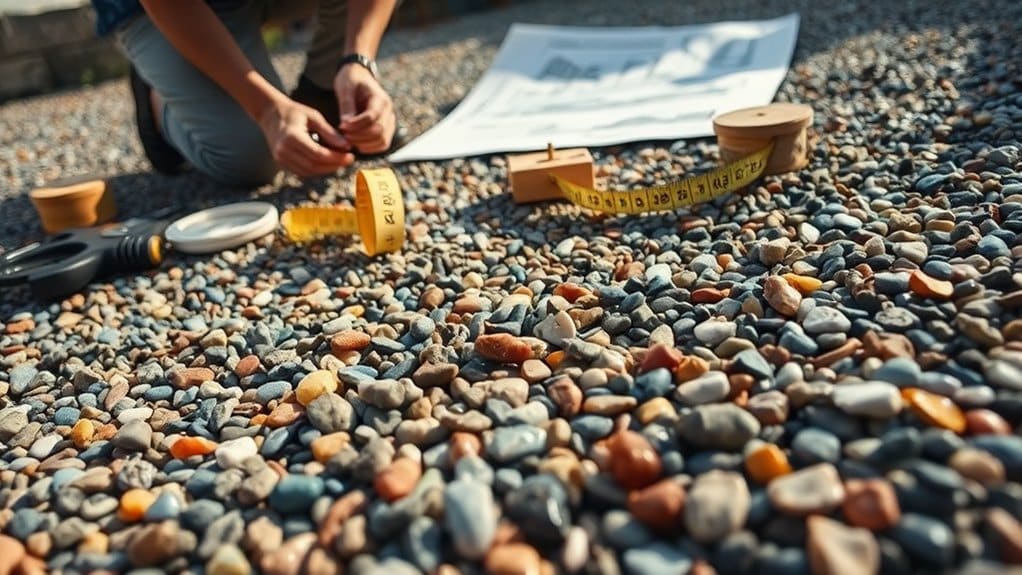
Getting Started with Resin-Bound Gravel
Before diving into your resin-bound project, nail down these key requirements. Each resin kit covers roughly 3.55m² at an 18mm depth – crucial for working out your materials. For driveways and heavily-used areas, stick to the recommended 18mm minimum thickness. Proper mixing ratios of resin and aggregates are crucial for strength during installation.
Check your base thoroughly. Whether it’s concrete or compacted aggregate, it needs proper load-bearing strength and drainage to prevent puddles forming. This is important as resin bound gravel provides excellent drainage properties, contributing to eco-friendly outdoor solutions.
Think about the total depth needed, including all base layers. If you might extend the area later, factor this into your initial planning – it’ll save you hassle and money down the line.
A clear grasp of these basics will help ensure your project runs smoothly from start to finish.
Assessing Technical Expertise Needed
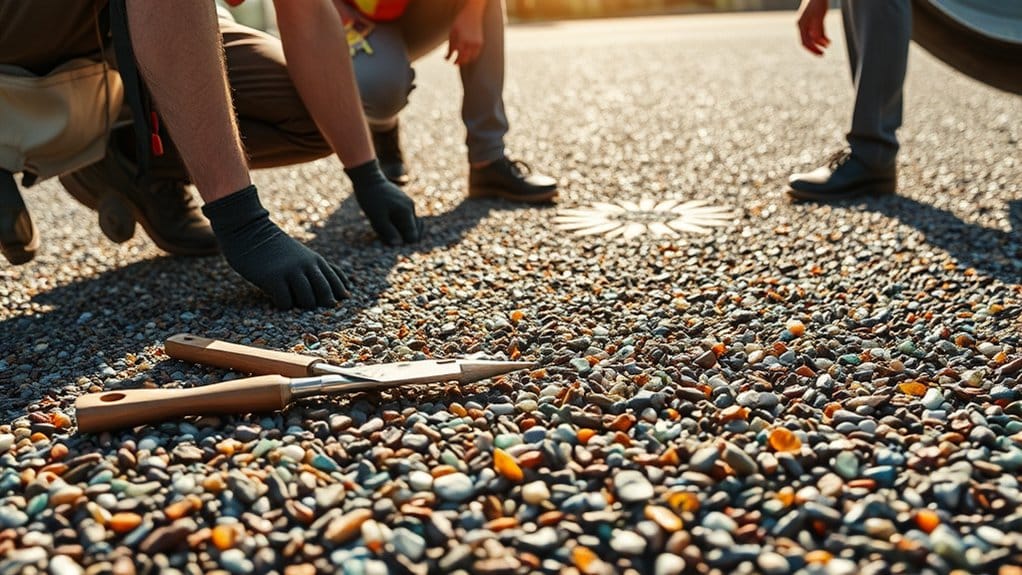
Essential Technical Skills for Resin-Bound Gravel
You’ll need proper technical know-how to get your resin-bound gravel project right. The key areas include:
Resin expertise: Understanding different resin types and how they behave in various weather conditions. Getting the mix ratios spot-on is crucial – think of it like baking, where precise measurements matter. A mastery of resin composition ensures that the final product achieves both performance and aesthetic goals.
Ground preparation: Your surface must be sound, level and have proper drainage. Much like building a house, the foundation makes all the difference. Proper resin surfacing ensures that the installation meets both aesthetic and functional requirements.
Application skills: Specialist tools and techniques are essential. The resin must be mixed and laid correctly within specific timeframes, particularly in British weather conditions.
Load requirements: Your surface needs to handle whatever you’re planning to put on it – whether it’s just foot traffic or regular car use.
Safety and standards: British building regulations and safety guidelines must be followed to the letter.
If you’re unsure about any of these aspects, best to call in the professionals. A botched DIY job could prove far costlier than hiring an expert from the start.
Evaluating Project Complexity
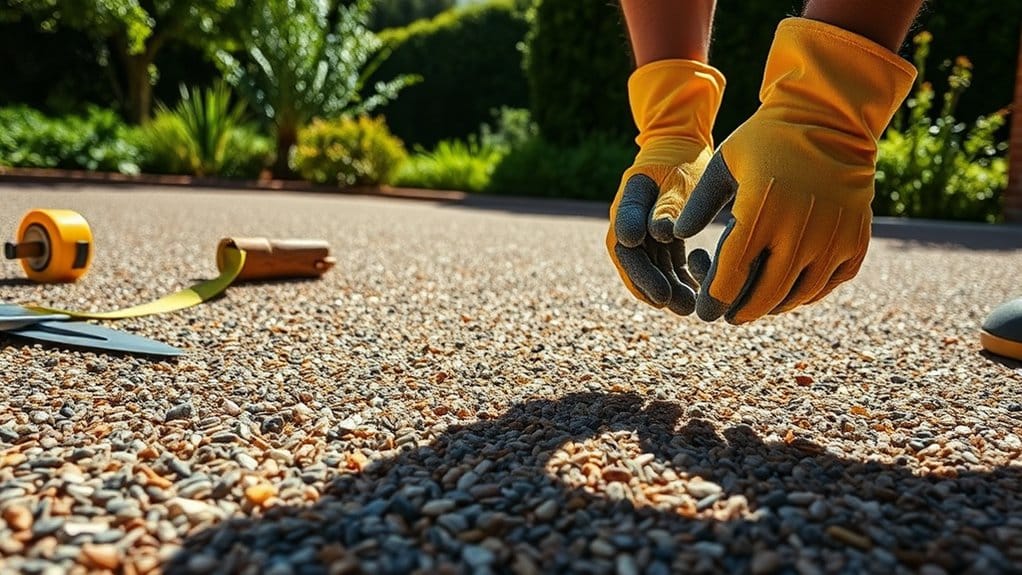
Assessing your resin-bound gravel project’s complexity helps ensure proper installation and lasting results. A thorough evaluation should cover several key factors.
The size and shape of your space matters – a straight garden path is far simpler than a winding driveway with multiple levels. Your ground preparation needs careful thought; British weather demands proper drainage, and the subbase must be rock-solid to prevent future issues. Additionally, consider that resin-bound surfacing offers a smooth, durable surface with aesthetic appeal which can enhance the overall look of your property. Proper surface preparation is essential to achieving optimal adhesion and longevity.
Think about how you’ll use the area. A residential pathway can manage with a standard specification, whilst a busy car park needs extra reinforcement. The British climate plays a crucial role too – you can’t lay resin in the rain or extreme cold, so timing is vital.
For complex jobs, like large driveways or commercial spaces, it’s worth getting a professional assessment. They’ll spot potential problems that mightn’t be obvious to the untrained eye and ensure the finished surface stands up to our weather conditions.
Heavy-use areas, such as shop fronts or school entrances, need particular attention to detail and often specialist installation methods. If you’re in doubt about any aspect, it’s best to consult an expert rather than risk costly mistakes.
Budgeting for Professional Services
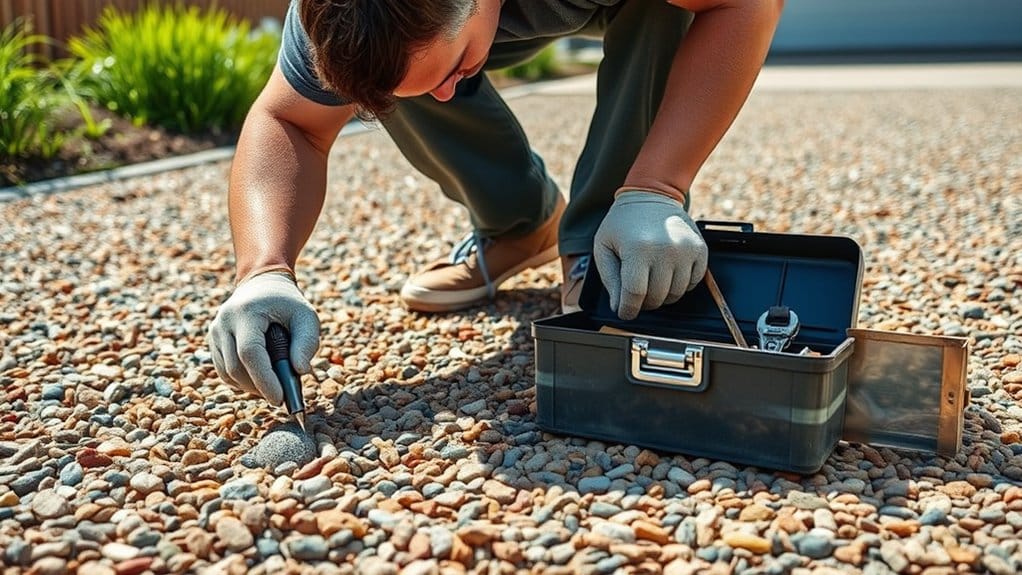
Getting Professional Services Costs Right
Essential to factor in all costs when hiring professionals for resin-bound gravel work. Typical prices range from £9 to £13 per square metre, though rates vary across UK regions.
Basic costs cover materials, labour and ground preparation, but uneven surfaces need extra groundwork, pushing prices up.
Don’t be swayed by cheap quotes – poor installation often leads to costly repairs down the line. Larger or complex areas naturally cost more, so plan your budget carefully. Set aside 10-15% extra for unexpected snags, like poor drainage or substrate issues.
Consider these key cost factors:
- Site accessibility
- Ground conditions
- Project size
- Local labour rates
- Material quality
A well-planned budget helps avoid nasty surprises and ensures quality results. Get several detailed quotes from reputable installers, and always check their previous work and references.
Ensuring Regulatory Compliance
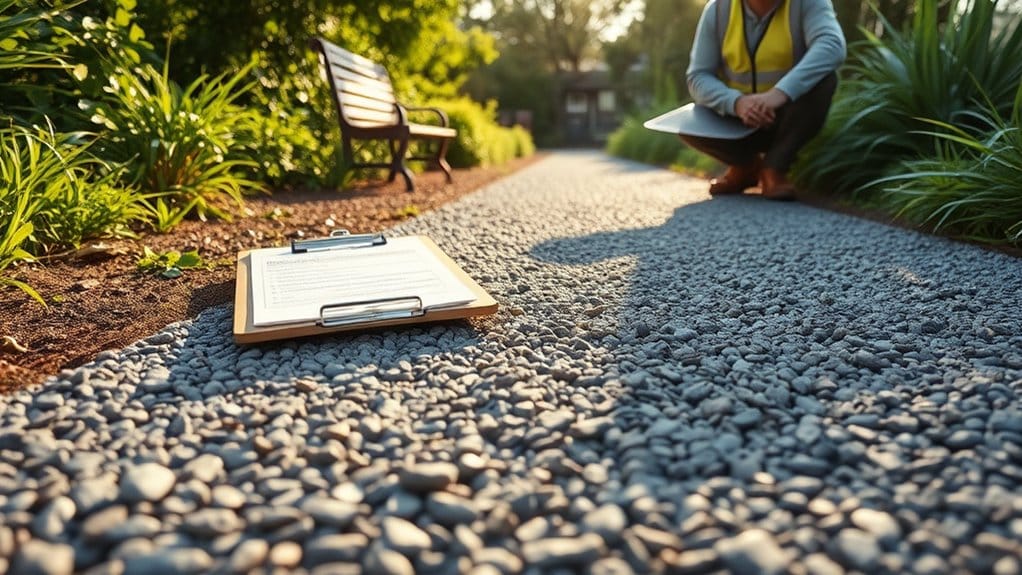
While steering through the process of installing resin-bound gravel, confirming compliance with various regulations is essential to avoid legal pitfalls and secure project longevity.
Here are three key areas to focus on:
- SUDS Compliance: Confirm your installation meets Sustainable Urban Drainage Systems (SUDS) standards to mitigate flood risks and enhance groundwater infiltration.
- REACH Regulations: Verify that all installers have the necessary training in diisocyanate handling, as non-compliance can lead to penalties and invalid warranties.
- BBA Certification: Choose materials with British Board of Agrément certification, as many councils mandate this for public projects, confirming product durability and regulatory standards adherence.
Regular compliance audits will help maintain these standards and protect your investment.
Timing and Seasonal Considerations
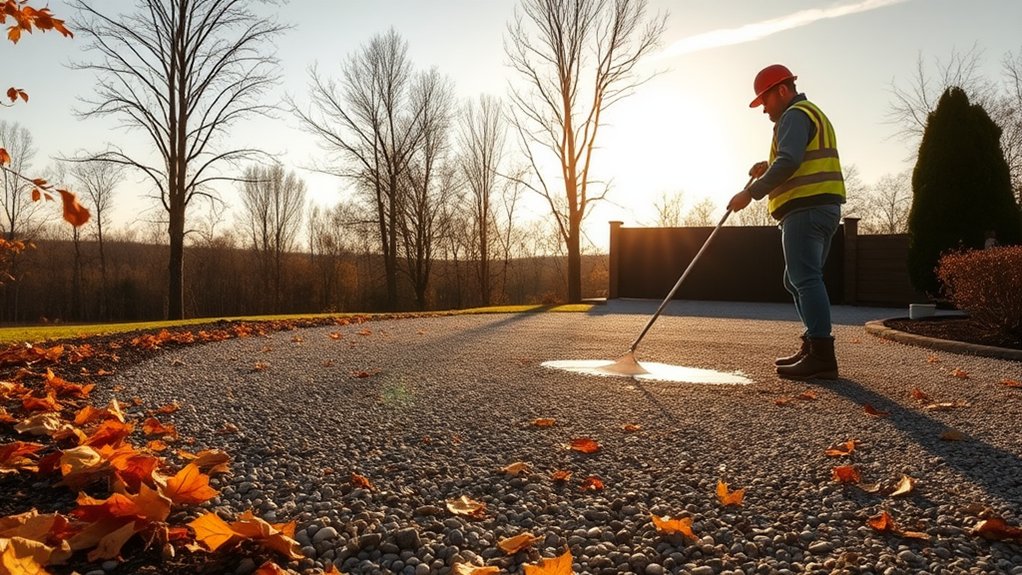
Installing resin-bound gravel requires careful timing to ensure the best results. Spring and early autumn offer ideal conditions with mild, dry weather that’s perfect for proper curing.
Summer installations can be tricky, as intense heat makes the resin set too quickly. Winter work isn’t recommended – cold temperatures slow down curing and frost can damage the surface.
Watch the weather forecast closely before starting. Rain and high humidity are your enemies, as they’ll affect how well the resin bonds and could ruin the finish.
Think of it like painting your garden fence – you wouldn’t do it on a rainy day or when frost is forecast.
For the best outcome, plan your installation for a dry day when temperatures are between 10-20°C. This approach will help ensure your resin-bound surface sets properly and lasts for years to come.
Recognizing Material and Design Challenges
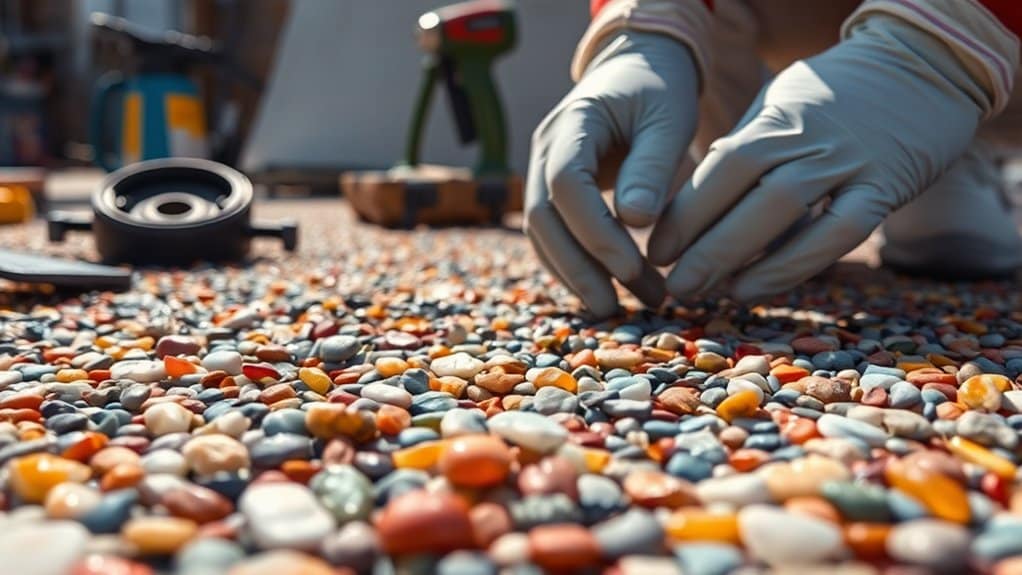
Material and design choices are crucial for resin-bound projects, affecting both looks and longevity. Each project needs careful planning to match your property’s style and practical needs.
Common challenges include choosing the right aggregate size, ensuring proper drainage and selecting UV-stable resins for exposed areas. Think about colour schemes that complement your home’s exterior and consider how different stone types weather over time.
Getting a qualified installer on board early helps prevent costly mistakes and ensures proper installation to British Standards.
Material Selection Importance
Material Selection Essentials
The right materials make or break resin-bound gravel installations, affecting both looks and performance. These factors ensure a lasting surface:
1. Aggregate Quality: Use clean stones free from dust, properly graded and packed for an even, strong surface.
Think of it like making a proper cuppa – you wouldn’t use old, dusty tea leaves.
2. Resin Compatibility: Pick suitable resin for your chosen aggregate.
Poor matching leads to weak spots, much like using the wrong mortar between bricks.
3. Weather Conditions: Lay during dry weather at moderate temps (typically 10-25°C).
British weather being what it is, check the forecast – rain and extreme temperatures can muck up the curing process.
Each element matters as much as the next.
Skimp on any, and you’ll likely face costly repairs down the line.
Custom Design Considerations
When planning a resin-bound gravel surface, you’ll face several key design decisions. The foundation is crucial – a proper subbase ensures your installation can handle daily use and vehicle weights.
Popular UK designs include contemporary geometric shapes and custom patterns that add character to driveways and garden paths.
Choose colours and textures that complement your property’s existing features, whether it’s a Victorian terrace or modern build. British weather plays a major role in maintenance needs; frost and heavy rain can affect the surface over time, so regular checks are vital.
A well-designed resin surface should flex slightly to prevent cracking, particularly important given our variable climate.
This durability not only protects your investment but also maintains your property’s kerb appeal for years to come.
Importance of Proper Drainage Systems
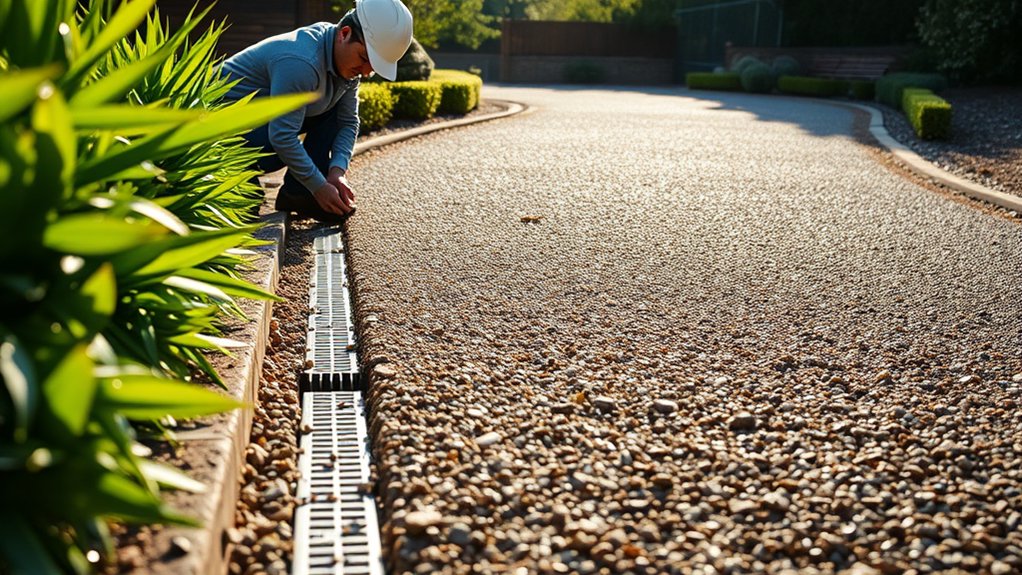
Essential Drainage Systems for Resin Surfaces
Proper drainage is crucial for resin-bound gravel surfaces to protect your investment and maintain its quality. Good drainage prevents water build-up, which can seriously damage the structure and spoil its appearance.
Three key drainage considerations:
- Erosion Protection: Smart drainage channels direct rainwater away effectively, stopping your gravel from washing away during heavy downpours.
- Surface Stability: The right drainage keeps the ground underneath stable – much like protecting your garden path from turning into a boggy mess after rain.
- Planning Rules: Following SuDS regulations isn’t just about ticking boxes – it helps manage rainfall sustainably and protects local water systems, particularly important in Britain’s wet climate.
These measures prove especially valuable during our notorious British winters, when poor drainage can turn a smart driveway into a waterlogged headache.
Planning for Long-term Maintenance
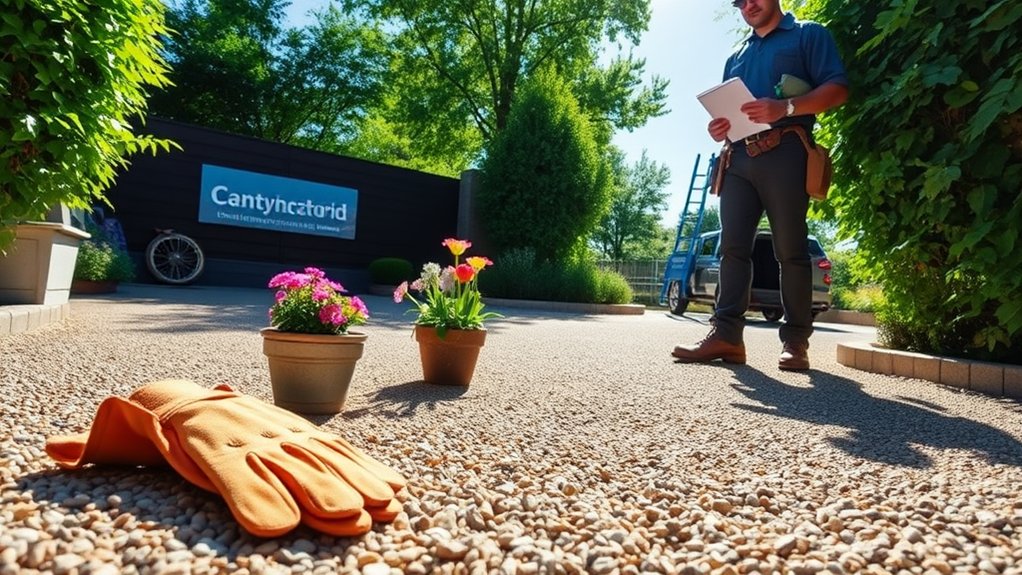
Regular maintenance is vital to protect your resin-bound gravel investment and keep it looking smart. A simple routine will help preserve your surface for years to come:
- Sweep and wash regularly to remove dirt, leaves and debris
- Clean up any spillages straight away to avoid staining
- Check for cracks during seasonal changes, particularly after winter
- Apply a protective sealant when needed
- Pull out any weeds as soon as they appear
- Consider recoating every 2-3 years to maintain the surface
Most maintenance tasks are straightforward DIY jobs, though you might want a professional for recoating work.
Whilst resin-bound gravel is fairly low-maintenance, catching problems early will save you money and hassle in the long run. A quarterly inspection should spot any issues before they become serious.
The Benefits of Professional Installation

Professional Installation Benefits for Resin-Bound Gravel
Professional installation makes a significant difference in resin-bound gravel projects, offering key advantages for UK homeowners:
1. Expert Assessment: Skilled installers spot potential issues before they become problems, checking soil conditions and ensuring proper foundations.
Think of it like having a surveyor check a house before purchase – they notice things most people wouldn’t.
2. SUDS Standards: UK regulations require proper water drainage solutions.
Professional installers understand these rules inside out, creating surfaces that comply with local authority standards whilst preventing puddles and flooding.
3. Long-Term Quality: Professional teams use premium materials and proven techniques, creating surfaces that withstand British weather.
A properly installed resin driveway typically lasts 15-20 years, compared to 5-10 years for DIY attempts.
Frequently Asked Questions
How Do I Choose the Right Resin for My Project?
Selecting the right resin for your project boils down to matching the material to your needs. For outdoor projects like garden paths, choose UV-resistant resin to prevent yellowing. Heavy-traffic areas such as driveways need tough, durable resins that won’t crack under pressure. If you’re working on a patio or poolside area, opt for permeable resin that meets UK drainage standards – particularly important given our wet climate. The right choice ensures your project stands up to British weather whilst maintaining its look.
What Are Common Mistakes in DIY Resin-Bound Installations?
Common DIY resin-bound mistakes often start with poor groundwork and incorrect mixing measurements. Skipping proper base compaction or using dirty stones can cause the surface to crack and crumble over time. A solid foundation and precise measurements are crucial for lasting results. Before starting, ensure you’ve got a proper sub-base and clean, dry aggregates – think of it like baking, where the right ingredients and measurements make all the difference.
Can Resin-Bound Gravel Be Installed Over Existing Surfaces?
Yes, resin-bound gravel works well over existing surfaces, but it’s vital to check compatibility first. The base surface needs proper assessment – whether it’s concrete, tarmac or block paving. Think of it like painting a wall: you wouldn’t start without checking the surface is sound and clean. Repair any cracks or damage before installation, and ensure the surface is dry and debris-free. A proper foundation means your resin-bound driveway or path will last for years without lifting or cracking.
How Long Does a Resin-Bound Installation Typically Last?
A quality resin-bound surface lasts between 10 and 25 years with proper care. The lifespan largely depends on the initial installation work and British weather conditions. Using top-grade materials and maintaining the surface regularly – much like caring for a garden patio – will help your investment last longer. Regular sweeping and occasional pressure washing keep it looking fresh and sturdy.
What Is the Best Way to Clean Resin-Bound Surfaces?
Regular cleaning of resin-bound surfaces is essential for maintaining their appearance and durability. Simply sweep with a stiff-bristled brush to remove dirt and debris, then rinse with clean water using moderate pressure. For stubborn stains, use a mild soap solution and avoid harsh chemicals that might damage the surface. During autumn, clear fallen leaves promptly to prevent staining, and tackle any moss growth early to stop it spreading. A quarterly deep clean will keep your resin-bound driveway or patio looking smart all year round.
Conclusion
Considering a resin-bound gravel project? A professional installer makes all the difference. Quality installation ensures your driveway or path meets British standards and lasts for years to come. Whilst DIY might seem tempting, proper resin laying requires specific tools, expertise and perfect weather conditions. A botched job could lead to costly repairs, uneven surfaces or poor drainage. Professional contractors bring proven experience, proper insurance and warranties – essential factors for such a significant home improvement. They’ll handle everything from ground preparation to the final finish, ensuring your investment adds genuine value to your property.
